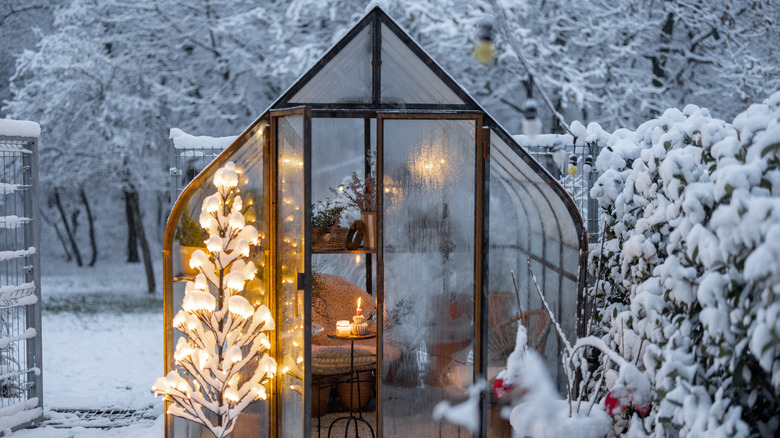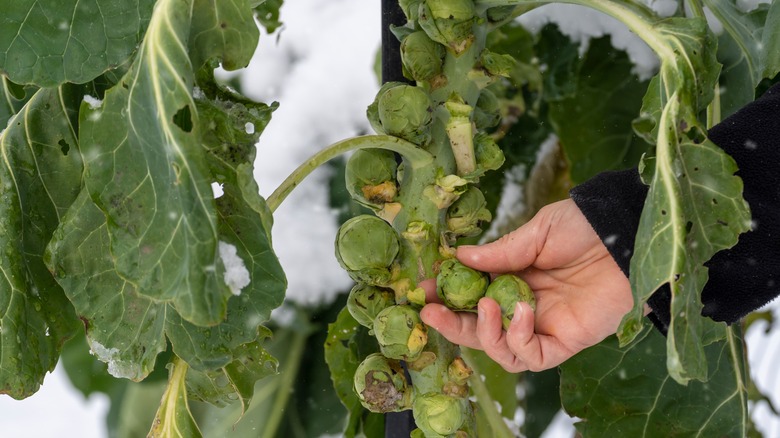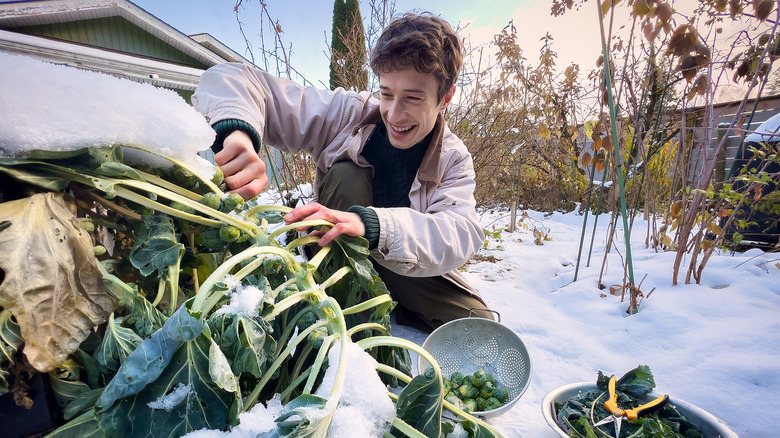The Tasty Vegetable That Will Thrive In Your Winter Garden
For those gardeners who live in colder climates, traditionally, winter is not a time associated with growing crops. Winter is usually a time of snow-covered fields, freezing temperatures, and the overwhelming urge to hibernate. However, one tasty vegetable thrives in the colder temperatures — the beloved Brussels sprout. Not only do Brussels sprouts prefer cooler temperatures, but the cold actually enhances their flavor profile!
If you don't have experience growing Brussels sprouts, don't worry. They're a super easy crop to grow and have the added benefit of tolerating cooler weather. While these veggies have a long evolutionary history, the sprouts we know and love today first came about in the 13th century when they were first cultivated in Belgium. They later became super popular and colloquially known as Brussels sprouts, named after Belgium's capital, Brussels. You may have noticed that they resemble baby cabbages; this is because they belong to the same family as cabbages, the Brassica family. While they were cultivated to the form we know them as today in Brussels, they are originally native to the Mediterranean region along with many other cabbage species.
Why the winter is an excellent time to grow Brussel sprouts
Brussel sprouts are cold-weather crops, making the winter the perfect time to grow them. While most crops won't grow in the cold winter temperatures, Brussels sprouts are cold hardy and can withstand temperatures of 20 degrees F and, in some cases, even 10 degrees F. Winter is not typically associated with any harvest since most veggie crops cannot withstand these temperatures, but for those who love growing their own food, Brussels sprouts are a great way to scratch that itch during the cold winter months.
Cold-hardy and slow-growing Brussels sprouts are the perfect crops to grow in the cooler months when you're craving fresh veggies from the garden. Interestingly enough, the cold weather sweetens the Brussels sprouts and cuts through that bitter taste that can sometimes be present in Brussels grown during warmer months. While Brussels can withstand short periods of frost, prolonged freezes may affect the crop. A little snow won't affect your harvest; however, if they get completely buried, it's best to pick them before they get damaged. Depending on your location, you have a pretty large window from late fall to early winter to get a good crop. If you want to experiment with growing more cold-hardy veggies, there are many other plants to start sowing in January.
How to grow Brussels sprouts in the winter
Growing Brussels sprouts in the winter is pretty straightforward and even has some perks. For one, you don't have to worry about insect pests or any other kind of pest like the pesky cabbage worms present during the summer growing season. Additionally, since they love the cold weather, there isn't much you need to do for them to grow and produce a sweet, delicious harvest. However, they are heavy feeders, so you want to ensure they get adequate fertilizer and nutrients before they mature. It's important to note that Brussels sprouts usually take three months to mature from seed, so it takes some planning to get the timing right.
It's recommended to start seeds 16 to 20 weeks before your first frost of the season. So, starting your Brussels seeds in late spring or summer is a good idea to ensure you have some mature plants come winter. While Brussels sprouts are cold-hardy, they must be well-established before tolerating these temperatures. This means regular watering, adding organic matter to the soil, and mulching around the roots as it gets colder to keep the soil warm. While you can direct sow Brussels seeds, starting them indoors is recommended because of their temperature and time requirements. When transplanting, they should be spaced 18 inches apart in 2 to 3-foot rows. Since they tend to be top-heavy with shallow roots, it helps to offer them support or stake them up.


